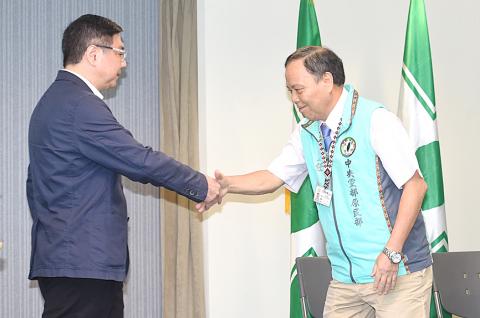A dispute broke out among Democratic Progressive Party (DPP) officials yesterday over the appointment of Tseng Chih-hsiang (曾志湘) as director of the party’s Department of Indigenous Affairs, after it was revealed that he had previously held pro-China views and promoted cross-strait political events.
During an interview just before the presidential election in January 2016, Tsai said: “If the pan-blue and pan-green parties do a bad job governing, while the Chinese Communist Party [CCP] has the means to do better, then I welcome the CCP to take charge,” the Chinese-language news site Mirror Media reported.
At the time, Tseng was chief of Taoyuan’s Fusing District (復興), a mountain Aboriginal region.

Photo: Liu Hsin-de, Taipei Times
He assumed office as an independent after then-district chief Fan Cheng-hsing (范振興) was removed upon being convicted of vote-buying in 2015.
Tseng, an Atayal, was a member of the Chinese Nationalist Party (KMT), but ran in the local elections in 2014 as an independent.
According to Mirror Media, in late 2016, Tseng in a separate interview with the China News Review agency in Hong Kong, which is reportedly funded by Beijing, said that the government’s New Southbound Policy is no help to the nation’s Aborigines, saying: “It is more pragmatic to go with the ‘two sides of the Taiwan Strait are one family’ policy. We are coordinating Taiwan’s five major Aboriginal regions ... to visit China to promote tourism and agricultural products.”
DPP Chairman Cho Jung-tai (卓榮泰) defended Tseng’s appointment, saying that his previous remarks represented his job and background at the time.
“Now that he has joined our party, it is more important for him to work according to our party’s plans and requirements,” he said.
Cho then showed a photograph of his old KMT membership card, saying: “Even I was a KMT member in the past. There are too many people who once belonged with the KMT... Now we welcome them to become DPP members.”
Tseng reportedly also promoted political events in Taiwan and China, and established good rapport with Chinese officials in charge of propaganda and “united front” activities targeting Taiwanese officials.
Local Chinese-language media reported that Tseng in June 2016 went to Pingtan Island in China’s Fujian Province to participate in a cross-strait political forum, and invited a number of Chinese provincial officials to Aboriginal celebrations in Fuhsing District the following month.
Tseng had good relations with Fang Ming (方明), deputy director of China’s Taiwan Affairs Office chapter in Pingtan, who led a Chinese delegation to the celebrations, Mirror Media reported.
Critics said that the DPP is drawing up legal amendments to restrict and introduce more severe punishments for people and businesses working on behalf of the Chinese government.
Tseng could leak the DPP’s internal discussions on national security, election campaign strategy and other sensitive issues, they said.
People within the party have complained about DPP Secretary-General Luo Wen-jia’s (羅文嘉) choice of Tseng, as well as other appointements.
Earlier this month, DPP Legislator Wang Ting-yu (王定宇) threatened to resign from the DPP Central Standing Committee in a row with Luo, saying: “The party headquarters is controlled by a small clique that makes job appointments on its own.”

Taiwan is to commence mass production of the Tien Kung (天弓, “Sky Bow”) III, IV and V missiles by the second quarter of this year if the legislature approves the government’s NT$1.25 trillion (US$39.78 billion) special defense budget, an official said yesterday. Commenting on condition of anonymity, a defense official with knowledge of the matter said that the advanced systems are expected to provide crucial capabilities against ballistic and cruise missiles for the proposed “T-Dome,” an advanced, multi-layered air defense network. The Tien Kung III is an air defense missile with a maximum interception altitude of 35km. The Tien Kung IV and V

The disruption of 941 flights in and out of Taiwan due to China’s large-scale military exercises was no accident, but rather the result of a “quasi-blockade” used to simulate creating the air and sea routes needed for an amphibious landing, a military expert said. The disruptions occurred on Tuesday and lasted about 10 hours as China conducted live-fire drills in the Taiwan Strait. The Civil Aviation Administration (CAA) said the exercises affected 857 international flights and 84 domestic flights, affecting more than 100,000 travelers. Su Tzu-yun (蘇紫雲), a research fellow at the government-sponsored Institute for National Defense and Security Research, said the air

Taiwan lacks effective and cost-efficient armaments to intercept rockets, making the planned “T-Dome” interception system necessary, two experts said on Tuesday. The concerns were raised after China’s military fired two waves of rockets during live-fire drills around Taiwan on Tuesday, part of two-day exercises code-named “Justice Mission 2025.” The first wave involved 17 rockets launched at 9am from Pingtan in China’s Fujian Province, according to Lieutenant General Hsieh Jih-sheng (謝日升) of the Office of the Deputy Chief of the General Staff for Intelligence at the Ministry of National Defense. Those rockets landed 70 nautical miles (129.6km) northeast of Keelung without flying over Taiwan,

A strong continental cold air mass is to bring pollutants to Taiwan from tomorrow, the Ministry of Environment said today, as it issued an “orange” air quality alert for most of the country. All of Taiwan except for Hualien and Taitung counties is to be under an “orange” air quality alert tomorrow, indicating air quality that is unhealthy for sensitive groups. In China, areas from Shandong to Shanghai have been enveloped in haze since Saturday, the ministry said in a news release. Yesterday, hourly concentrations of PM2.5 in these areas ranged from 65 to 160 micrograms per cubic meter (mg/m³), and pollutants were